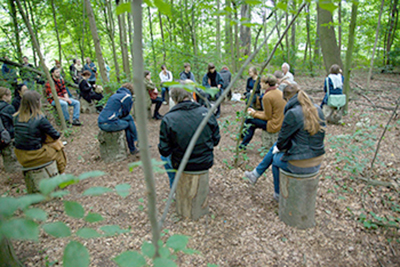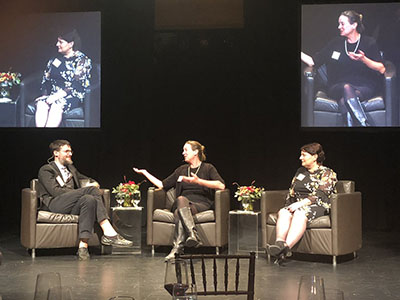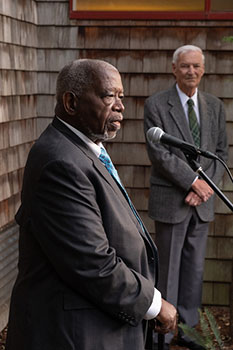Campus News
A year of growth, change, and forging ahead at UC Santa Cruz
This was a year of many highlights, from a 24-hour online festival of giving to an immersive soundscape in the redwoods and an all-star panel of journalists sharing their tales from the field. Here are some big moments from 2018.


At UC Santa Cruz, 2018 was a banner year for stargazers, social justice advocates, literary lights, cancer researchers, and students taking to the streets to provide data for a sweeping survey on housing.
It was also the first official UC Santa Cruz “Year of Alumni,” celebrating the success and influence of Banana Slugs across the globe.
This year was a time of big change on campus, with the announcement of an ambitious renewal project aiming to update iconic Kresge College, knitting beloved landmarks with new upgrades to continue a legacy while accommodating today’s student body.
Other major changes were bittersweet. This fall, UC Santa Cruz Chancellor George Blumenthal announced his plans to retire.
“I have decided that the time is right for me to step aside and allow someone else to assume the leadership of this remarkable institution,” he said.

UC President Janet Napolitano praised and thanked Blumenthal for his years of service and his “exceptional career at the University of California [that] has spanned more than 46 years.”
Speaking of extraordinary service, J. Herman Blake, the beloved founding provost of Oakes College, was back on campus for the rededication of the Oakes Provost House, which was named after Blake during an emotional ceremony. Blake was “overwhelmed” to hear about this honor.
“In the provost house, we saw it all. It reflected the extraordinary natural setting of UC Santa Cruz—the redwoods, the view of the bay, and all of nature—human nature, intellectual nature, and the social bond. All these things came together there,” Blake said. Listen to this special podcast including Blake’s remarks at the renaming ceremony.
Generosity, preservation, and a “gonzo” donation
There were no dull moments on UC Santa Cruz’s busy campus calendar. In any given day, something big was happening. The year started off with an impressive burst of philanthropy, when UC Santa Cruz’s Giving Day, a 24-hour online festival of giving, smashed previous records, with donors kicking in $520,000 for 122 worthy projects. Giving Day 2018 yielded more than $600,000 with more than 6,300 gifts for 160 projects, according to preliminary tallies.

In this action-packed year, UC Santa Cruz’s Library system proved once again that it is far more than a peaceful place for books and contemplation. Its staff painstakingly digitized over 6,000 photos from the Pirkle Jones/Ruth-Marion Baruch collection and gratefully accepted an impressive new collection of pioneering gonzo journalist Hunter S. Thompson books and papers.
Science in the news: stars, genes, fruit flies, and more
This was a banner year for scientific exploration and innovation at UC Santa Cruz. Astronomers explored the potentials of “face recognition for galaxies,” with artificial intelligence bringing new tools to astronomy. The Kepler telescope examined a star in its death throes.
Scientists pushed the frontiers of genetics. Using technology pioneered at UC Santa Cruz, researchers were able to sequence a human genome using a pocket-sized device. Also, UC Santa Cruz researchers examined the link between genetics and human brain size. A set of three nearly identical genes found only in humans appear to play a critical role in the development of our large brains, according to the study led by researchers at UC Santa Cruz.
Also on the genes front, data science researchers tackled privacy challenges associated with genomics. Computer scientist Abhradeep Guha Thakurta won National Science Foundation funding to investigate ways to protect the privacy of individuals while allowing access to large genomic data sets.
This year the Physical & Biological Sciences distinguished themselves yet again at UC Santa Cruz. Biologist Beth Shapiro was selected as Howard Hughes Medical Institute investigator. Scientists took on many initiatives that benefited the public good, from fruit fly research leading to a potential new drug for diseases afflicting millions, including “river blindness,” to a groundwater recharge project informing statewide sustainability efforts.
Humanities in the news
The Humanities Division was a consistent and impressive newsmaker this year, with a detailed special report on finding truth in today’s partisan world, and talented Banana Slug authors using their voices, and their literary talents, to make the world a better place. Alumna author Kate Schatz casts a spotlight on “rad girls” under age 20 with her new book, the latest her series of “rad” bestsellers. Alumna Reyna Grande penned a New York Times op-ed on immigration.
Also this year, the legendary poet Gary Snyder drew a capacity crowd when he read on campus for the annual Morton Marcus Memorial Poetry Reading. Often described as the “poet laureate of deep ecology,” Snyder has become a spokesman for the preservation of the natural world and the cultures that seek to protect it. In fact, the Humanities had a hand in some of the most button-pushing lectures and readings this year.
Computer scientist, composer, visual artist, and acclaimed author Jaron Lanier delivered the 2018 Peggy Downes Baskin Ethics Lecture this fall on campus, “How the Internet Failed and How to Recreate It.” Lanier’s most recent book, Ten Arguments for Deleting Your Social Media Accounts Right Now, outlines how the benefits of social media can’t possibly offset the devastating losses to our personal freedom, dignity, happiness, and well-being. But Lanier also optimistically envisions a new humanistic type of social networking that can lead to a better way to live and connect to the world.
Also this year, visitors to the UC Santa Cruz Night at the Museum came away with an immersive sense of 1968 protest movements and their global impacts.
Arts in the limelight
It was another exciting year for the Arts Division on campus, with creative faculty and graduates adding their expertise and vision to the world. UC Santa Cruz’s eminent professor of film and digital media B. Ruby Rich was invited to join the Academy of Motion Picture Arts and Sciences. The world’s preeminent film organization, the Academy is made up of more than 8,000 distinguished members working in cinema. Open to qualified filmmakers around the world, it is best known for presenting the annual Academy Awards.
Also this year, UC Santa Cruz art professor Jimin Lee had a solo exhibition at an extremely unlikely arts hub—the Demilitarized Zone (DMZ) that separates North and South Korea. Established in 1953 as part of an armistice agreement that ended three years of brutal war, the DMZ is a 2.5-mile-wide band that runs 155 miles across the Korean peninsula, serving as a buffer zone between the two countries.
Lee’s exhibition, Global Station: Until the Next Voyage, featured original print works she began creating in 2013 to explore themes of the movement of the body and objects in space—in reference to migration, globalization, transportation, and mobility.
Slugs contributed mightily to the movies. An Arts professor’s film premiered at the prestigious Berlin International Film Festival; the first feature film by UC Santa Cruz alumna Bridgette Auger (SocDoc ’11) had its premiere on November 14 at DOC NYC, the largest documentary film festival in the United States; and 19 UC Santa Cruz film students collaborated on a feature-length documentary about the Santa Cruz housing crisis.
Another arts highlight had to be heard to be believed. The Institute of the Arts and Sciences of the UC Santa Cruz Arts Division presented one of the year’s most immersive events, FOREST (for a thousand years…), an epic 28-minute sound installation hosted by the UC Santa Cruz Arboretum and Botanic Garden. This innovatove work by renowned Canadian artists Janet Cardiff and George Bures Miller opened last spring in the redwood grove at the Arboretum. Those who experienced this soundscape of clattering hooves, droning planes, birdsong, and battle cries will never forget it. The Arboretum and the Institute of the Arts and Sciences also introduced their beguiling “Future Garden” environmental art installation, drawing crowds of curious sight-seers to its scenic grounds.
Alumni in the spotlight
This year was a chance to savor the far-ranging accomplishments of proud UC Santa Cruz graduates. Alumni had an oversized impact in everything from journalism to cinema, song writing, and searching the galaxy.
Just to give you a very small sample of our alumni in the news, take a stroll through our Year of Alumni page, where you will read—among many others—the inspiring stories about the career of scientist, astronaut, and award-winning educator Kathy Sullivan (Cowell ’73, Earth sciences), the first American woman to walk in space; and the return to campus of Adilah Barnes (Cowell ’72, individual major in black theater, Theater Arts Department), who worked with students from UC Santa Cruz’s African American Theater Arts Troupe in their production of the groundbreaking play A Raisin in the Sun by Lorraine Hansberry, in which she played the role of Mama. The year was also an opportunity to recognize some leading public health leaders who got their start in UC Santa Cruz’s celebrated Community Studies program.
Alumni seemed to be everywhere, whether they were championing diversity and social justice in major motion pictures or protecting and sharing the histories of beautiful murals with Salvadoran subjects and themes in the walls of San Francisco’s historic Mission neighborhood.
Alumni dominate Founders festivities
Since we’re on the topic of omnipresent alumni, graduates of UC Santa Cruz were front and center in the latest edition of our Founders Celebration, with a special on-stage dialogue featuring Martha Mendoza (Kresge ’88, journalism and education), Associated Press correspondent and a two-time Pulitzer Prize winner; Carrie Kahn (College Eight/Rachel Carson ’87, biology), NPR international correspondent based in Mexico City, covering Mexico, the Caribbean, and Central America; and Mike McPhate (Kresge ’00, anthropology major/journalism minor), founder of the California Sun, a daily e-newsletter that curates general-interest news about California. The panel regaled the audience with their tales from the field. The evening’s honorees included a slew of Slugs:
- Fiat Lux Award recipient John Laird (Stevenson ’72, politics), a trailblazing public servant. Laird, first elected to the Santa Cruz City Council in 1981, went on to be one of the first openly gay mayors in the country. A former state Assemblyman, he was appointed California Secretary for Natural Resources by Governor Jerry Brown in 2011;
- Faculty Research Award recipient Lise Getoor, a professor in the Computer Science and Engineering Department at UC Santa Cruz and founding director of the UC Santa Cruz Data, Discovery, and Decisions (D3) Data Research Center; and
- Alumni Achievement Award honoree Natalie Batalha (Ph.D. ’97, astrophysics), astrophysicist and lead scientist on the NASA Kepler Mission. In 2015, she joined the leadership team of a new NASA initiative dedicated to the search for evidence of life beyond the solar system. NASA’s Nexus for Exoplanet System Science (NExSS) brings teams from multiple disciplines together to understand the diversity of worlds. Kepler has demonstrated that Earth-size planets abound in the galaxy.
A weekend in the sun
Alumni also had their very own weekend in the sun this spring with Alumni Weekend 2018, a moveable Slug-fest for alumni and their loved ones. Attractions included a tour through the labs of Science Hill, a roof-raising lecture about ethical universities, a peaceful stroll through an organic farm, and an energetic 5k run through campus.
The three days of festivities brought an impressive crowd of 1,500. The many highlights included a dialogue between beloved feminist studies professor Bettina Aptheker and campus provost/executive vice chancellor Marlene Tromp at the recently reopened campus landmark, the UC Santa Cruz Quarry Amphitheater.
A steady and reliable force on campus for four decades, Aptheker gave a powerful speech about the ethical role of public universities. “Given the state of ‘no ethics’ percolating through the current administration in Washington, it is very hard to know quite where to begin today,” Aptheker said during the Faculty Keynote/Baskin Ethics Lecture. “The ethical collapse in Washington pervades the country.”
Faculty in the world
Aptheker was just one example of faculty members taking strong stands and making a difference. Forget about those Ivory Tower stereotypes. UC Santa Cruz faculty and researchers had local, regional, and nationwide impacts. Earlier this year in a landmark court ruling that prohibits solitary confinement in Canada, a Canadian judge relied heavily on expert testimony by Psychology Professor Craig Haney. Haney, who has spent decades studying the psychological effects of imprisonment, was involved in the nine-week trial that took place last summer in Vancouver, testifying about the effects of segregation on mental health.
Also this year, Courtney Bonam, an assistant professor of psychology, studied how racial bias tainted perceptions of neighborhoods. UC Santa Cruz Associate Professor of Sociology Steve McKay and UC Santa Cruz Sociology Professor Miriam Greenberg continued their work on No Place Like Home, a groundbreaking report on the housing crisis. With the able assistance of UC Santa Cruz undergraduates—more than 200 of them—the professors made international headlines for an ambitious project intending to calibrate the scope, and side effects, of the housing quandary. Their research incorporates hard facts, analysis, and human stories from renters all over Santa Cruz County.
If recalling all the big ideas, accomplishments, and landmarks of the past year makes you feel a little breathless, you’re not alone. With 2018 fairly bursting with accomplishments and highlights, the UC Santa Cruz community is eager to see what 2019 will bring.